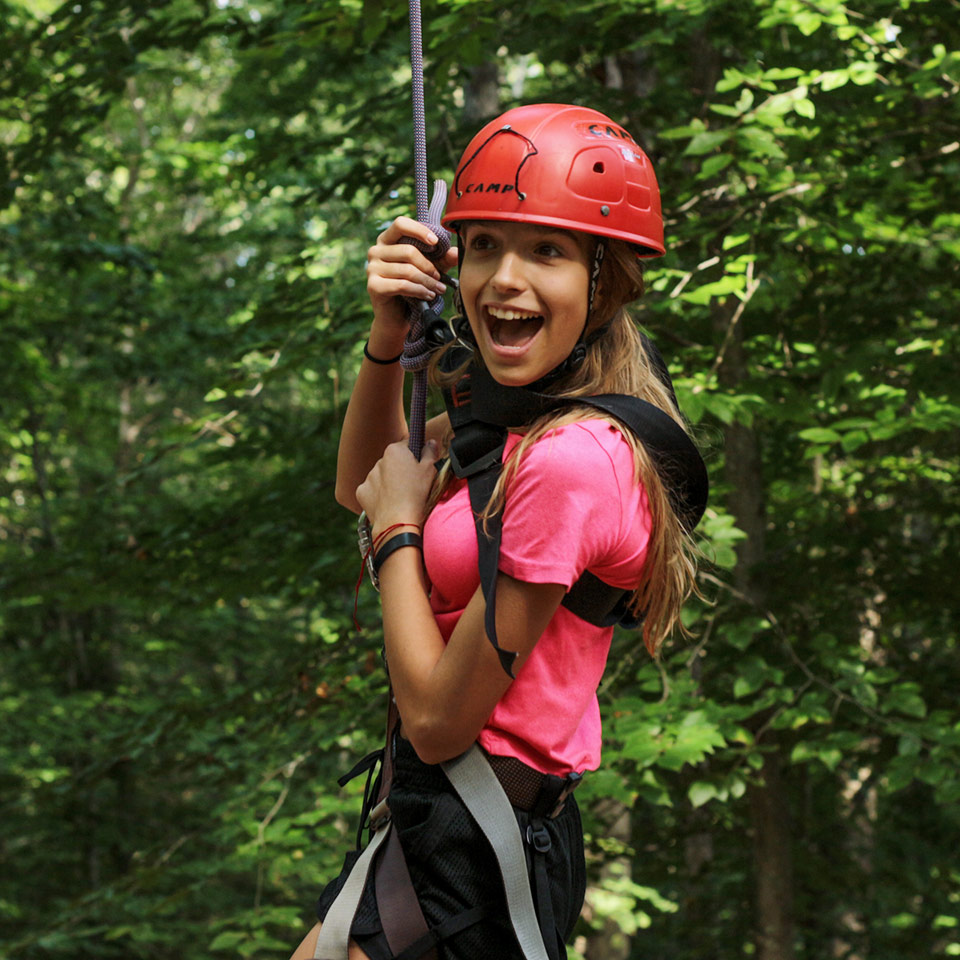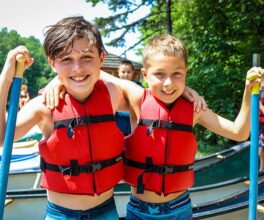At Camp Friendship, we create a home away from home for every single one of our campers. With kids of every age and stage trying summer camp for the first time, we meet each individual where they are.
When it comes to visiting their new summer home for the first time ever, it’s natural for kids to feel nervous. The butterflies start stirring in their stomachs, sending up a confusing mix of excitement and fear.
To settle any pre-camp nerves, it’s important to manage expectations for your camper. If you’re not sure how to do that, you’ve come to the right place!
It’s normal to fear the unknown
The most common nerves shared by first-time campers come from fear of the unknown. Camp challenges kids to navigate a new physical environment while simultaneously exploring a new social-emotional environment. It’s a brave thing to do, especially without their typical support system.
First-time campers often worry about the social dynamics of a cabin setting. Even for campers who have shared a bedroom before, the thought of sharing an unfamiliar cabin with a group of other kids can be daunting. Plus, making friends in an entirely new social group requires a lot of courage.
The more information campers have before they arrive, the better. Getting them familiar with camp spaces and routines will accelerate the adjustment period, leaving more time to build genuine connections with their new cabinmates. Making friends at summer camp is what it’s all about, after all!
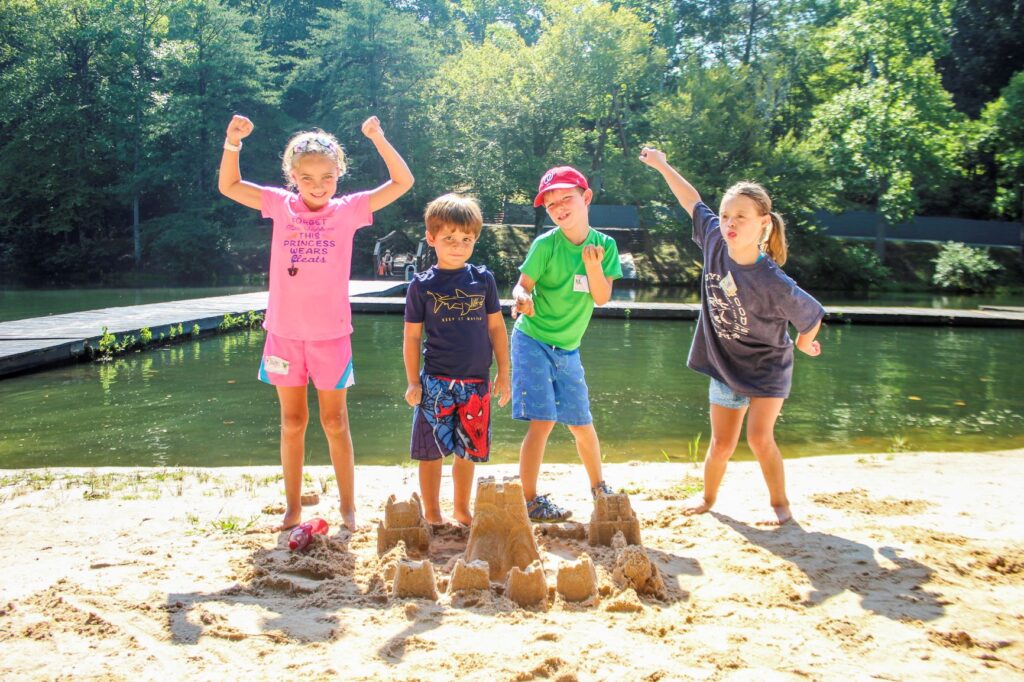

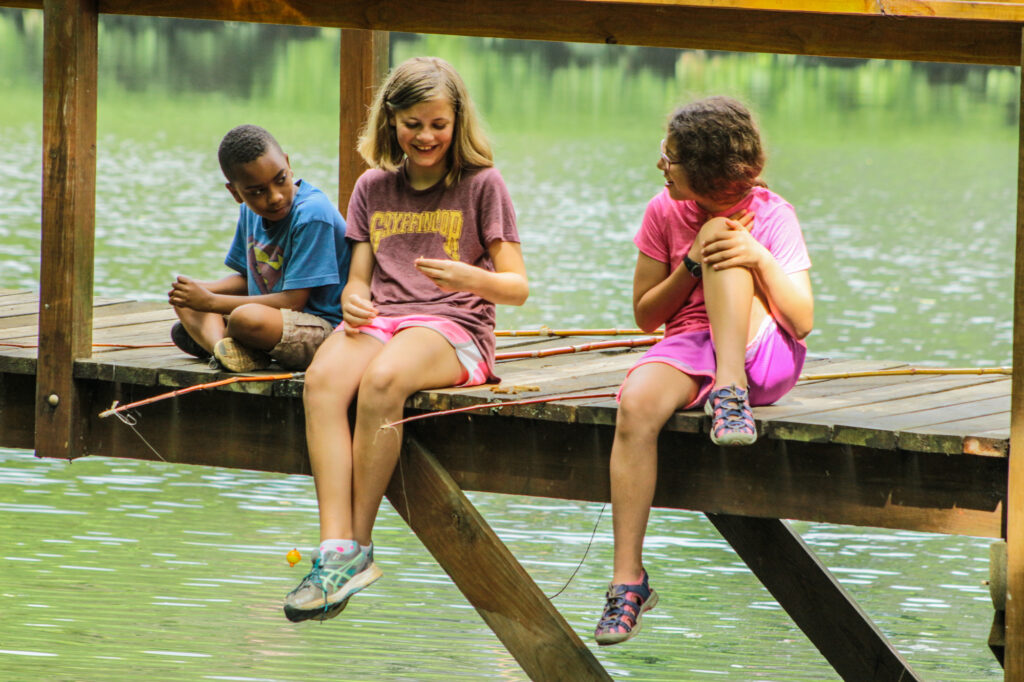
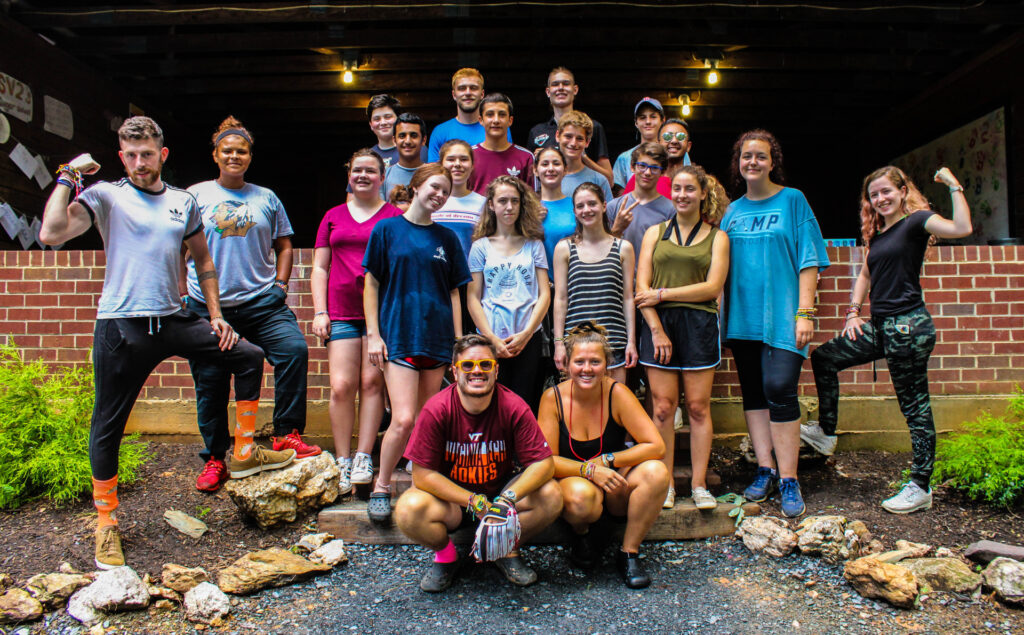
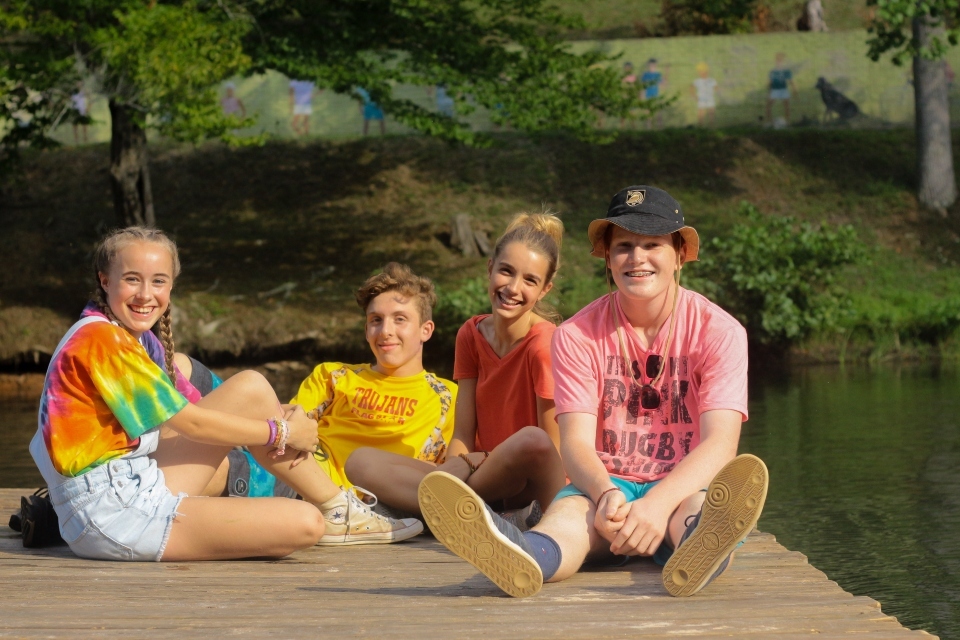
Parents can make the unknown known
It is hugely important to acknowledge that what your first-time camper is doing requires bravery. Most campers don’t realize that they can feel anxious and still be having a good time until someone tells them. Luckily, there are plenty of things that parents can do with their children to prepare them for camp.
Familiarize your child with camp
Go over our camp map with your child and identify major landmarks like the pool or dining hall. Then, make those visions a reality by watching videos on our YouTube page.
Go over their friend-making strategy
It sounds silly, but often these conversations get your camper thinking about all the positive ways they can contribute to their new social dynamic.
Talk to them about how to ask questions
Sometimes campers are still in “school mode” and aren’t comfortable asking their counselors the millions of questions in their brains. Campers may feel best about preparing a written list of questions to ask their counselor upon arriving.
Practice packing
The big question of “do I have everything I need?” is a universal fear among campers of every age. Address this concern by going over the packing list with your camper, and maybe even packing their day pack with them! (Tip: start with this packing list.)
Talk about food options
When confronted with so many new things, even the most familiar situations can feel daunting. If your camper is nervous about the dining hall and the abundance of options, talk to them about what meal you might pick out for them.
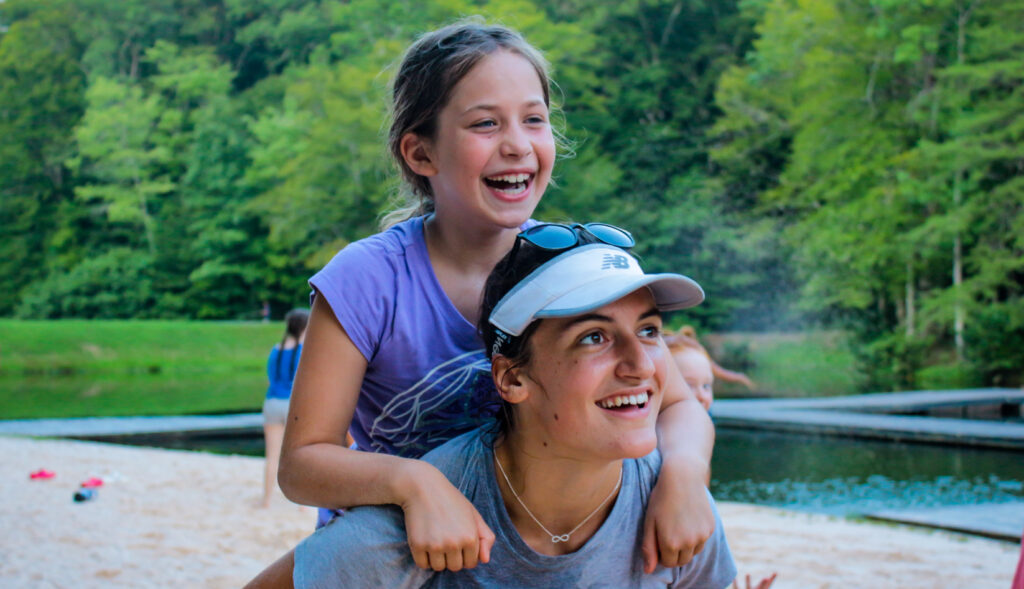
Set campers up for success
The Camper Profile, which parents can complete online before the first day of camp, informs us about fears like bugs or thunderstorms. It’s also easy to identify what a camper is nervous or fearful about based on their questions. We prepare our counselors for all of these questions and encourage campers to be as descriptive and honest as possible.
Counselors are rockstar helpers
Counselors help turn first-day jitters into excitement by using information, encouragement, and thoughtful support to ease campers into the experience.
Calm first-time nerves
The best tool against first-time nerves is information, which you give your camper by following the above steps. When arriving at camp, counselors are as clear and helpful as possible to ensure that campers feel comfortable and have all their questions answered.
The second-best tool is the art of distraction. Campers are sometimes stressed about their pending activity schedules, which they don’t receive until Monday morning. Luckily, these nerves are quickly forgotten when there’s something to do, and there’s plenty they’ll be doing on the first day of camp!
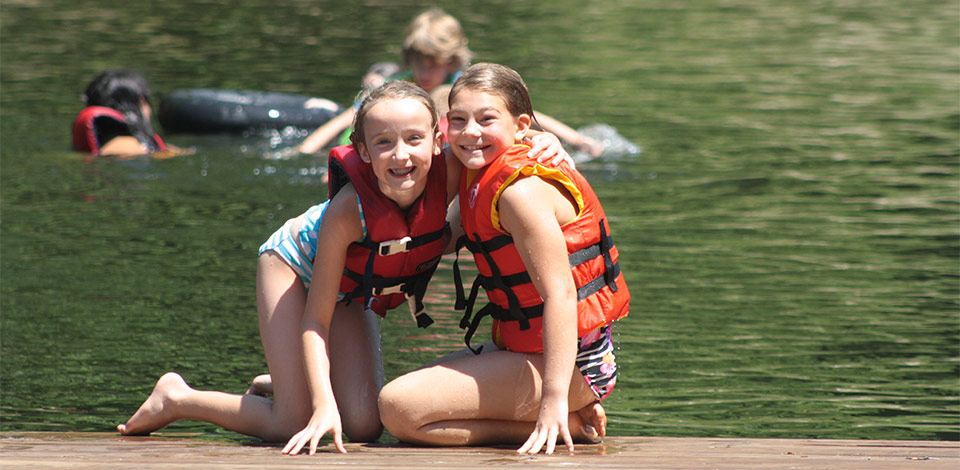
Jump in with both feet
The “swim check,” which takes place after check-in, makes many new campers nervous. In fact, it’s common to find that even the most confident swimmers feel a bit anxious. We try to minimize campers’ anxiety, even down to the name. By not calling it a “swim test,” we hope to alleviate the fear of failure some children experience in school.
Our counselors help by fully explaining to campers the what, why, and how of the swim check. While most nerves dissipate after the first evening, our counselors regularly engage with their campers to ensure that any feelings of uneasiness are quickly acknowledged. Our counselors work with campers to determine the strategies that will help them feel successful.
There are many simple accommodations counselors can make to set campers up for success. We’ve printed multiple back-up copies of a camper’s schedule to ease their fear of losing it (or going to the wrong activity). If a child worries about getting lost, we print a map, circle their activity areas, and walk with them on their first day. In some cases, counselors wake certain individuals up a few minutes early so that they don’t feel rushed getting ready.
Challenge by choice
With unknowns in the past, all that’s left for campers to do is get excited about the new experiences awaiting them! It’s important to us that campers choose their own activities, so they can try new things on their own terms.
Our “Challenge by Choice” philosophy means that we give campers the opportunity, without pressure from their counselors, to challenge themselves in different activities. This growth mindset encourages campers to acknowledge their individual wins as they step up to challenges.
It’s very common for kids to try new things at camp, partly because our activities are ones they’ll rarely get the chance to do at home. Kids will surprise themselves by trying mountain boarding, canoeing, or the ropes course because they feel encouraged and supported by those around them. That’s what summer camp is all about!
A note on being tech-free
Summer camp can feel like a euphoric experience when campers have never done anything like it before. We understand, though, that going tech-free may add a level of stress and anxiety for campers who have a digital comfort zone. Training empowers our counselors with language to address these feelings with campers and ensure that their needs are being met.
We also understand that not all campers have the same social batteries as other campers. Some kids have a much lower tolerance for high-energy social activities, and that’s okay! We keep this in mind by offering a mix of high-energy activities alongside opportunities for campers to take a break and decompress if needed.
We often see kids let their guard down after their first full day at camp. They’ve seen the big picture: they know how an entire day runs, they know their activities, and they’ve been with their cabinmates and counselors for over 24 hours. Now they know what camp is like!
After getting to know their cabinmates and counselors, campers gather together at our opening campfire. Performances of different skits and acts fill the campfire scene, and no two campfires are ever the same. No words can do this special gathering justice…you just have to experience it for yourself!
